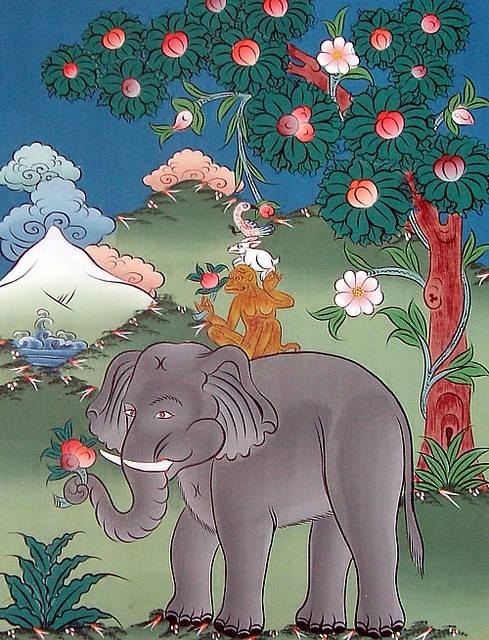Gross National Happiness

(Four Harmonious Friends)
Bhutan has valued the principle of GNH coined by His Majesty the 4th King of Bhutan in 1974 to emphasize the importance of happiness as a society measure for the progress rather than measure a national Gross Domestic Product (GDP). The vision of GNH has guided Bhutan’s development and policy formation. A unique among the grassroots level to balance the “middle path” for equitable socio-economic development with an integrated environmental conservation, culture promotion and good governance. The concept of the guiding philosophy of GNH is in lines with the symbol of four harmonious friends, where a peace prevail happiness prevails.
Bhutan remained isolation from the world but the GNH existed largely an instinctive insight and guiding light for the government and her people alike that material progress. As Bhutan increasingly engaged with the global community, joining international organizations, substantial efforts were made to define, explain and even measure GNH Indices were created, measurements were recorded and screening tools for government policy were created, and the second phase in the development of GNH saw its practical implementation in government become a living reality. Enshrined in the Constitution of 2008 the role of GNH is firmly established now at the heart of the nation and government.
The GNH perfectly coined with the four harmonious friends the peace prevails throughout the nation’s philosophy for well-being of her people. A GNH is parts and parcel for the livelihood of Bhutan, you can be a GNH Hero!
Natural Environment
Bhutan embarked another milestones as an Environment an ecological wonder. Rising from the Indian plains to the Tibetan plateau, it is a natural landscape of immense beauty and diversity. Folds of forested hills, rugged cliffs, fast rivers and young valleys fall from high snow-covered peaks. Austere barren expanses stretch between colossal luminous veined mountains. Patchwork fields of subtly contrasting hues nestle within spontaneous kaleidoscopic vegetation. There are a great variety of individual locales, differentiated by their particular combination of altitudinal, climatic and topographical conditions. These harbor a wealth of flora and fauna, the sheer mass and variety of which is almost unparalleled within such a limited space: giant rhododendron and rare orchid, majestic tiger and quirky takin, colorful pheasant and graceful black-necked crane. An Environment plays a greater role for the pillars to the GNH, Bhutan has policy to maintains 60 percentages of forest forever, making a glimpse would further have enhanced to be an Environment Hero! You can able to take the memories, but no the foot prints.
More remarkable still is the manner in which entire ecosystems remain relatively uncompromised by human activity. There is little evidence in Bhutan of teeming masses uncontrollably jostling for tenuous positions or the commanding technological innovations with which man has wrested control of his environment from Mother Nature. Most inhabitants still realize a simple sustainable existence within their dominant natural settings. The inhospitable mountainous backdrop serves to both inhibit whole scale human encroachment and accentuate the primacy of the natural world. Ecology thus survives in all its immense complex multidimensional totality, perpetually interacting within understated natural habitats and relatively stable hierarchies.
Religion & Culture
Bhutan is the only country to maintain Mahayana Buddhism in its Tantric Vajrayana form as the official religion. The main practicing schools are the state sponsored Drukpa Kagyupa and the Nyingmapa. Buddhism transects all strata of society, underpinning multiple aspects of the culture. Indeed, religion is the focal point for the arts, festivals and a considerably above average number of individuals. The presence of so many monasteries, temples and stupas, monks and tulkus (reincarnations of high lamas) is indicative of the overarching role religion plays throughout the nation. Bhutan is being considered one to the last Shangri-La, in the world, so you can be a Shangri–La Hero!
ENQUIRY NOW
INCLUDED
- Bhutan VISA fee
- Sustainable development fee & taxes
- Dedicated English speaking tour guide
- Dedicated tour vehicle and driver
- 3-star accommodation (twin sharing)
- Daily 3 meals (B/L/D)
- Airport transfers
- Bottled water
- Entry fees to parks and monuments
NOT INCLUDED
- Flights to and from Bhutan
- Personal expense/shopping
- Beverages (soda/juice/alcohol)
- 4 or 5-star accommodation (extra charges will apply)
- Travel insurance
- Tips for guide and driver
